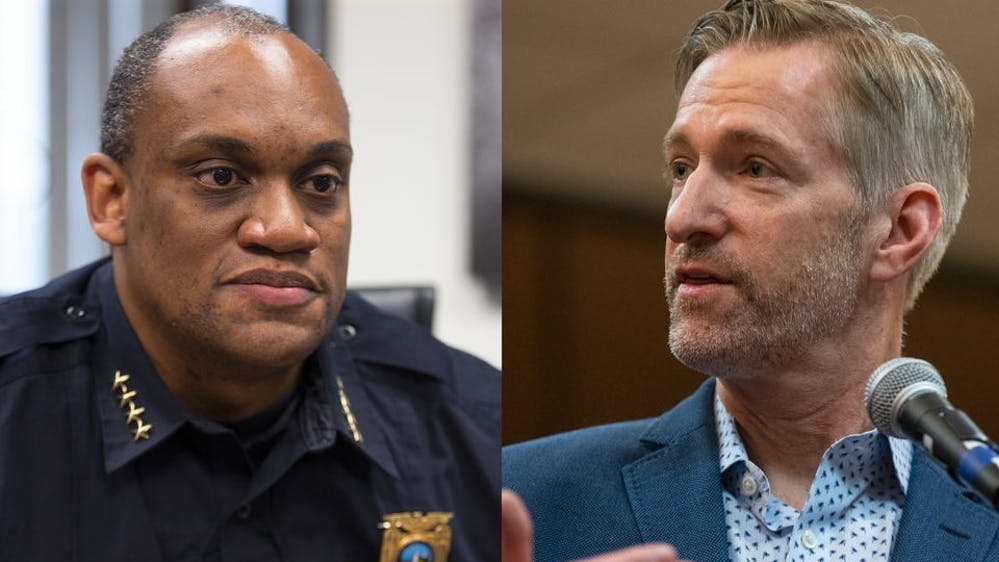Portland Mayor Ted Wheeler will seek around $7M in new public safety spending focused on hiring back 25 retired officers, buying body-worn cameras and bolstering recruitment.
November 04, 2021 – By Maxine Bernstein – Source OregonLive.com (TNS)
PORTLAND, Oregon — Mayor Ted Wheeler will seek around $7 million in new public safety spending this fall focused on hiring back 25 retired police officers, buying body-worn cameras and bolstering recruitment to attract 200 more sworn officers and 100 unarmed public safety specialists in the next three years.
The mayor told a community town hall this week that he believes he has the votes on the City Council to support the hiring spree.
“This is the deadliest era in modern times for the city of Portland,” Wheeler said at a news conference Wednesday. “Many Portlanders no longer feel safe in their city. … Without these investments, the outlook for violence in our city is grim.”
“There is such a thing as too few officers,” he said, “and we’ve reached that point.”
The key question is whether the Police Bureau could even reach that hiring goal should it receive the money for all those jobs.
It hasn’t been able to fill 128 vacancies it now has amid stiff competition for candidates in the region and nationwide.
Wheeler acknowledged that the goal – endorsed by Police Chief Chuck Lovell — is an “ambitious” and “bold” one.
The session was sponsored by People for Portland, a newly launched, anonymously funded effort pushing local elected leaders for action on police reform, homelessness and other issues.
The Police Bureau has the lowest authorized force – 916 sworn officers — in 28 years, according to police figures.
While the numbers remain fluid as the ideas take shape, Wheeler’s fall public safety proposal includes $400,000 to hire back 25 recent police retirees to immediately fill vacancies, $2.6 million to buy body cameras, and $865,000 to help the state offer a regional basic police training academy in Portland with seats for 45 Portland police recruits and the certification of five Portland police staff members as trainers.
He also wants about $450,000 to add 40 public safety specialists, $100,000 to cover overtime for police recruiters, $125,000 to hire a civilian dean of police training and $400,000 to hire an outside consultant to review police use of force during the past year’s protests.
The mayor and chief also are considering offering new recruits $25,000 in signing bonuses to stay competitive. Seattle’s mayor last month announced $25,000 signing bonuses for experienced officers or dispatchers and $10,000 bonuses for new police recruits.
Wheeler will call for $325,000 for support services for those most affected by gun violence and $100,000 toward a police truth and reconciliation program.
Requests for the city’s new Community Safety Division, run by Mike Myers, include $300,000 to add two full-time public information officers, $300,000 to do a five-year Portland police staffing study and $300,000 to hire a consultant to draft a violence reduction plan.
Other sought-after investments come from existing funding: about $1.4 million for the citywide expansion of Portland Street Response and enhanced community outreach, tapping into the already-approved $4.7 million set aside in a contingency fund; and $750,000 toward a Behavioral Health Emergency Coordination Network to help develop a replacement for the shuttered Central City Concern sobering station.
The mayor also wants to use $950,000 available from vacancies for five full-time positions to help transfer non-emergency calls to the 311 program and ease long waits for 911 as well as $324,000 from existing accounts to consolidate public safety financial management in the Community Safety Division.
The proposals will go before the City Council for a vote later this month.
The City Budget Office has estimated council members have an unprecedented extra $62 million to spend from a surplus to the city’s general fund, though current city rules say half must be set aside for capital projects.
“These funds are an opportunity to stabilize our city and can at as a bridge while we wait for longer term investments to take shape,” Wheeler said.
The mayor’s office estimates that continuing support for the proposed programs will cost another $7.6 million in the next fiscal year.
Police Face Hiring Challenges
Retired Portland Police Deputy Chief Bob Day said Tuesday night that many people probably ask why anyone would want to become a Portland police officer considering what he characterized as the “wholesale condemnation of law enforcement” in the city the past year.
That atmosphere — including council-imposed budget cuts, disbanding of special police teams and wide criticism for force used by police during racial justice protests — has led officers to retire or resign at an unusually fast pace and some to accept policing jobs elsewhere in Oregon or out of state.
Besides competition from other agencies, the state’s basic police academy that trains new officers wouldn’t have the capacity “to absorb the numbers that the mayor mentioned,” Day said.
The last time the Police Bureau made a big push to hire so many officers occurred in 1999, when the agency sent officers on aggressive out-of-state recruitment trips and dubbed the effort Operation 80.
The bureau was unable to reach its goal, and Operation 80 started with 71 recruits that year.
One of the long-standing problems within the Police Bureau is that its hiring and recruitment have come in fits-and-starts – leading to large groups of officers retiring at one time every few years.
“We need a long-term vision, sustained approach, not just a three-year but five-to-10-year plans,” Day said. “We really need a long-term, sustained approach towards recruiting development.”
Officers are leaving faster than the bureau can fill their spots, the mayor’s senior aide Sam Adams said last week, so the retire-rehire program is considered “the only way in the near term we can get police officers on the force.”
About 84 Portland police officers have either retired or are about to retire and will be eligible to be rehired in the next year.
The mayor wants $400,000 to immediately hire back 25 retirees and will seek another $1.6 million in next year’s budget to rehire another 25 for a total of 50. There are now nine rehired retirees working in the Police Bureau.
While the bureau has the money for its vacant authorized positions, the $400,000 would cover additional costs for bringing back retired officers, including the city’s contribution under the state’s Public Employee Retirement System. The retirees would receive their pensions through the city’s separate Fire and Police Disability and Retirement Fund, but return as employees under the state retirement system.
Wheeler said he wants Myers, the city’s new community safety transition director, to work closely with the police chief on a long-term staffing plan that would look at “what the need is, where the gaps are and go about that on a year-to-year basis.”
The mayor hopes to add two recruiters in the Bureau of Human Resources to help police with aggressive outreach to attract new officers. The city already has sought proposals for an outside consultant to help conduct background checks for new officers, according to the mayor’s office.
He said the bureau is facing a critical staffing shortage and community members are frustrated by long police response times to their emergency calls and the increasing violence on the city’s streets.
“We need more officers stat,” Wheeler said Wednesday. He lamented that the proposed Focused Intervention Team of officers, intended last spring to be dedicated to targeting gun violence, isn’t active yet.
“The Focused Intervention Team needs to be in the field yesterday,” he said. Two sergeants have been selected to lead the team and more than 30 officers have applied for 12 slots.
Officers initially were reluctant to apply for the team because they were unsure if they’d have city leaders’ support following the dismantling last summer of the bureau’s Gun Violence Reduction Team amid concerns about its disproportionate stops of people of color.
While Wheeler called for another 40 unarmed public safety support specialist positions, the bureau has only 13 of 34 authorized positions filled now. The council funded 22 of the positions in the 2021-22 budget.
The public safety specialists now are asked to handle low-risk tasks to free officers to take emergency calls, such as accepting and retrieving found property or doing traffic control during public events or at the edge of crime scenes.
HIRING ANNOUNCEMENT DRAWS PUSHBACK
Wheeler’s statement at the online forum about seeking more police officers drew some immediate criticism on Twitter from community activists.
“If you hire 300+ officers in Portland without any other programs or supports the only thing you will do is ensure that another generation of Black and brown youth will spend their lives in Prison,” wrote Lakayana Drury, who directs the nonprofit Word Is Bond, which strives to improve relations between young Black men and police.
Commissioner Jo Ann Hardesty, in a recent re-election campaign video, said more officers aren’t the answer.
“There’s a perception that more police officers will make us safe,” she said in the video, adding: “But that’s never been true” as an old photo flashes on the screen of what looks like police in the Jim Crow-era South.
“People are fearful of law enforcement and what happens when you call,” she said. Among the images in the video is a memorial on a wall for Patrick Kimmons, a man who shot and wounded two men outside a downtown nightclub before Portland police fatally shot him in a parking lot as he fled.
Sgt. Aaron Schmautz, a 17-year bureau veteran who was elected the new president of the Portland Police Association and started in the role on Monday, said the bureau needs as many officers “as we can get.”
The union has pushed for the retire-rehire program, arguing that it’s a quick way to bring back “trained, quality good police officers who can work today,” he said.
“The places we’ve been reduced are the places we’re hurting,” he added. He cited the dismantling of specialty units such as the traffic division and school resource officers, all reassigned to fill patrol shifts, and the elimination of the Gun Violence Reduction Team.
Some of the sought-after spending follows demands made by the U.S. Department of Justice.
Federal lawyers have directed the city to equip officers with body cameras and put a civilian in charge of police training to get back into compliance with a 2014 settlement agreement calling for policing changes to address excessive force complaints. The city is still negotiating policies governing the use of body cameras and storage of their footage, Wheeler said.
The City Council has scheduled a work session on the fall budget adjustments Thursday. The council is set to bring the fall spending proposals forward at its Nov. 10 meeting and vote on Nov. 17.
— Maxine Bernstein
Email at mbernstein@oregonian.com; 503-221-8212
Follow on Twitter @maxoregonian
©2021 Advance Local Media LLC. Visit oregonlive.com. Distributed by Tribune Content Agency, LLC.

